German stage and film actress Jutta Freybe (1917–1971) was the attractive blond leading lady in ten films during the Nazi era.
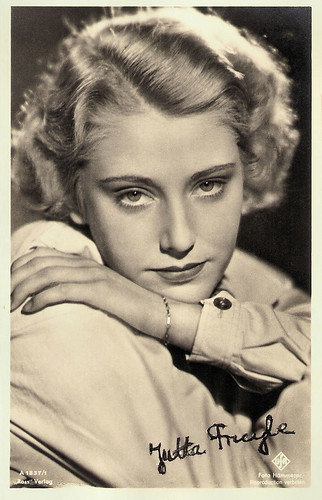
German postcard by Ross Verlag, no. A 1837/1, 1937-1938. Photo: Hammerer / Ufa.
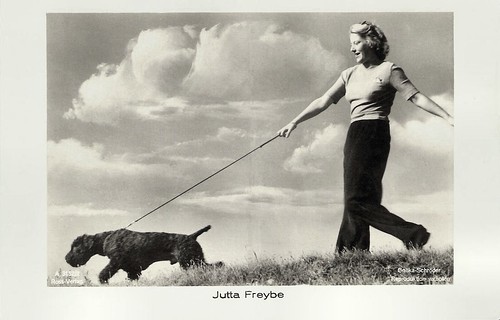
German postcard by Ross Verlag, no. A 3152/2, 1941-1944. Photo: Gnilka-Schröder.
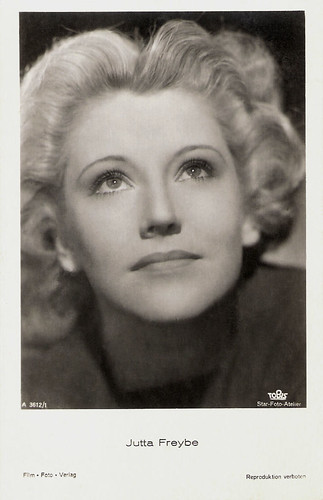
German postcard by Film-Foto-Verlag, no. A 3612/1, 1941-1944. Photo: Tobis / Star-Foto-Atelier.
Jutta Freybe was born in Berlin in 1917. She was the daughter of Major Paul Freybe and his wife, Paula Vick, the daughter of a merchant. Her older sisters were the writers Johanna Sibelius and Martha Albrand (a.k.a. Katrin Holland).
After theatrical training by director Hans Schlenk, Jutta was engaged at the Landestheater (State Theatre) and performed in various small roles.
Her film career started with a part in the short film Die Wunderschießbude/The Miracle Shooter (Hans Fritz Köllner, 1934), produced by the Ufa. In 1937 she co-starred in the romance Liebe kann lügen/Love Can Lie (Heinz Helbig, 1937) with Karl Ludwig Diehl and Dorothea Wieck. It was her breakthrough and more leading film roles soon followed.
Willy Fritsch was her co-star in Gewitterflug zu Claudia/A Thunderstorm flight to Claudia (Erich Waschneck, 1937). She starred opposite Paul Hartmann in Pour le Mérite (Karl Ritter, 1938), produced by the Ufa. This Nazi propaganda film, which chronicles the rise of the German Luftwaffe (Air Force) from World War I until Adolf Hitler took power in 1933, was forbidden after the Second World War.
Other films were Was tun, Sybille?/What to do, Sybille? (Peter Paul Brauer, 1938), the drama Zwischen den Eltern/Between the Parents (Hans Hinrich, 1938) again opposite Willy Fritsch, and the crime drama Sensationsprozess Casilla/Sensation Process Casilla (Eduard von Borsody, 1939), starring Heinrich George.
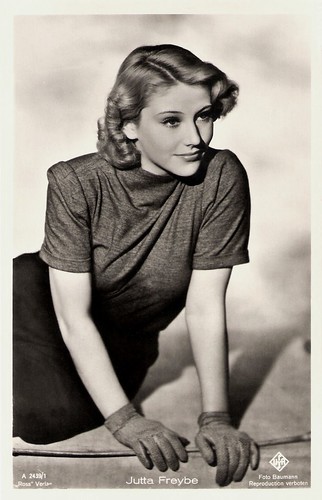
German postcard by Ross Verlag, no. A 2439/1, 1939-1940. Photo: Baumann / Ufa.
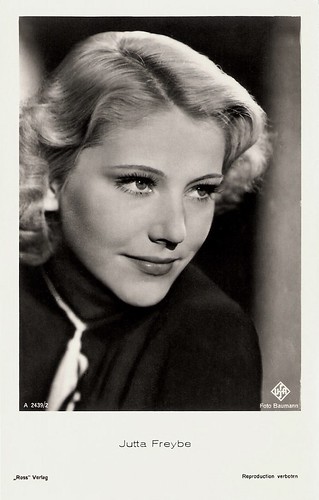
German postcard by Ross Verlag, no. A 2439/2, 1939-1940. Photo: Baumann / Ufa.
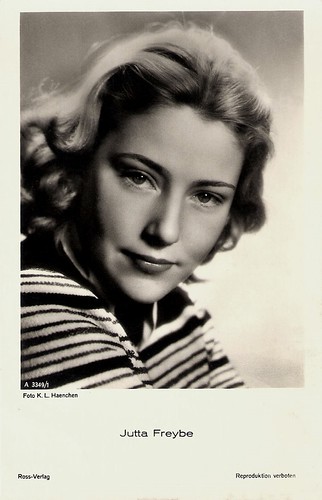
German postcard by Ross Verlag, no. A 3349/1, 1941-1944. Photo: K.L. Haenchen.
In 1939, Jutta Freybe married star actor Albert Matterstock, but the marriage ended in a divorce because of his morphine addiction.
She appeared that year in two more films, Silvesternacht am Alexanderplatz/New Year's Eve at the Alexanderplatz (Richard Schneider-Edenkoben, 1939) with Hannes Stelzer, and the crime film Alarm auf Station III/Alarm at Station III (Philipp Lothar Mayring, 1939) as the bride of Gustav Fröhlich.
During wartime, she only took part in one film. Her final role was as a doctor in the spy thriller Die goldene Spinne/The Golden Spider (Erich Engels, 1943), at the side of Kirsten Heiberg and Harald Paulsen.
Lars Bellman at IMDb: “A pair of Soviet Spies use seduction and blackmail to discover the secrets of a new German tank. This is another war propaganda movie, with strong anti-Soviet tendencies. Scandinavian actress Kirsten Heiberg is a pleasure to look at in this otherwise below-average movie.” After the war, this film was also forbidden by the Allied forces.
After this film the then 26-years-old actress retired from the film business and little was heard from her since. Jutta Freybe died in Büsum, West Germany, in 1971. She was 53 and largely forgotten.
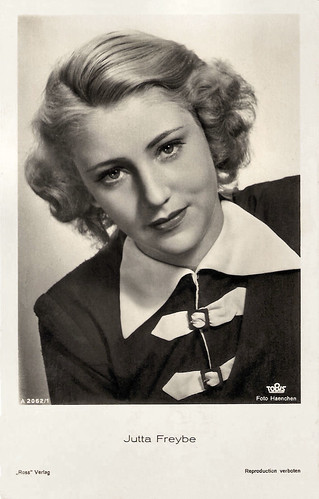
German postcard by Ross Verlag, no. A 2062/1, 1939-1940. Photo: Haenchen / Tobis.
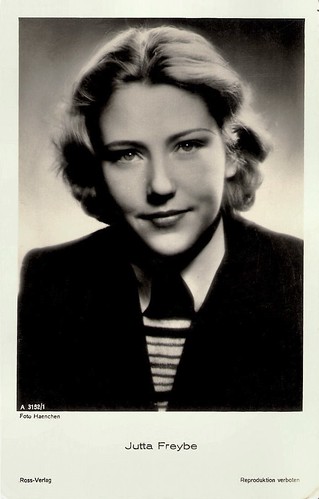
German postcard by Ross Verlag, no. A 3152/1, 1941-1944. Photo: Haenchen.
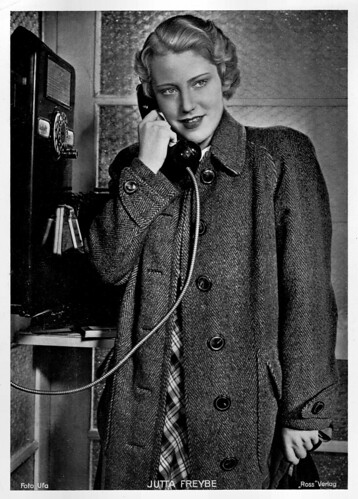
Big German card by Film-Foto-Verlag. Photo: Ufa.
Sources: Stephanie d’Heil (Steffi-line – German), Wikipedia (German and English) and IMDb.
This post was last updated on 16 April 2024.

German postcard by Ross Verlag, no. A 1837/1, 1937-1938. Photo: Hammerer / Ufa.

German postcard by Ross Verlag, no. A 3152/2, 1941-1944. Photo: Gnilka-Schröder.

German postcard by Film-Foto-Verlag, no. A 3612/1, 1941-1944. Photo: Tobis / Star-Foto-Atelier.
Love can lie
Jutta Freybe was born in Berlin in 1917. She was the daughter of Major Paul Freybe and his wife, Paula Vick, the daughter of a merchant. Her older sisters were the writers Johanna Sibelius and Martha Albrand (a.k.a. Katrin Holland).
After theatrical training by director Hans Schlenk, Jutta was engaged at the Landestheater (State Theatre) and performed in various small roles.
Her film career started with a part in the short film Die Wunderschießbude/The Miracle Shooter (Hans Fritz Köllner, 1934), produced by the Ufa. In 1937 she co-starred in the romance Liebe kann lügen/Love Can Lie (Heinz Helbig, 1937) with Karl Ludwig Diehl and Dorothea Wieck. It was her breakthrough and more leading film roles soon followed.
Willy Fritsch was her co-star in Gewitterflug zu Claudia/A Thunderstorm flight to Claudia (Erich Waschneck, 1937). She starred opposite Paul Hartmann in Pour le Mérite (Karl Ritter, 1938), produced by the Ufa. This Nazi propaganda film, which chronicles the rise of the German Luftwaffe (Air Force) from World War I until Adolf Hitler took power in 1933, was forbidden after the Second World War.
Other films were Was tun, Sybille?/What to do, Sybille? (Peter Paul Brauer, 1938), the drama Zwischen den Eltern/Between the Parents (Hans Hinrich, 1938) again opposite Willy Fritsch, and the crime drama Sensationsprozess Casilla/Sensation Process Casilla (Eduard von Borsody, 1939), starring Heinrich George.

German postcard by Ross Verlag, no. A 2439/1, 1939-1940. Photo: Baumann / Ufa.

German postcard by Ross Verlag, no. A 2439/2, 1939-1940. Photo: Baumann / Ufa.

German postcard by Ross Verlag, no. A 3349/1, 1941-1944. Photo: K.L. Haenchen.
The golden spider
In 1939, Jutta Freybe married star actor Albert Matterstock, but the marriage ended in a divorce because of his morphine addiction.
She appeared that year in two more films, Silvesternacht am Alexanderplatz/New Year's Eve at the Alexanderplatz (Richard Schneider-Edenkoben, 1939) with Hannes Stelzer, and the crime film Alarm auf Station III/Alarm at Station III (Philipp Lothar Mayring, 1939) as the bride of Gustav Fröhlich.
During wartime, she only took part in one film. Her final role was as a doctor in the spy thriller Die goldene Spinne/The Golden Spider (Erich Engels, 1943), at the side of Kirsten Heiberg and Harald Paulsen.
Lars Bellman at IMDb: “A pair of Soviet Spies use seduction and blackmail to discover the secrets of a new German tank. This is another war propaganda movie, with strong anti-Soviet tendencies. Scandinavian actress Kirsten Heiberg is a pleasure to look at in this otherwise below-average movie.” After the war, this film was also forbidden by the Allied forces.
After this film the then 26-years-old actress retired from the film business and little was heard from her since. Jutta Freybe died in Büsum, West Germany, in 1971. She was 53 and largely forgotten.

German postcard by Ross Verlag, no. A 2062/1, 1939-1940. Photo: Haenchen / Tobis.

German postcard by Ross Verlag, no. A 3152/1, 1941-1944. Photo: Haenchen.

Big German card by Film-Foto-Verlag. Photo: Ufa.
Sources: Stephanie d’Heil (Steffi-line – German), Wikipedia (German and English) and IMDb.
This post was last updated on 16 April 2024.
No comments:
Post a Comment